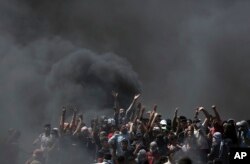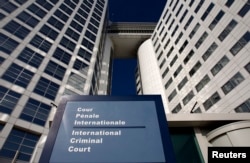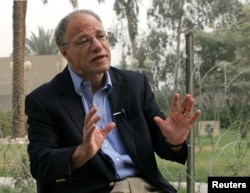Calling it a “historic step” toward justice, the Palestinian foreign minister asked the International Criminal Court on Tuesday to open an “immediate investigation” into alleged Israeli crimes committed against the Palestinian people.
The development was sure to worsen the already troubled relations between the internationally backed Palestinian Authority and Israeli Prime Minister Benjamin Netanyahu’s government. Peace talks have been frozen for over four years, and contacts between the two sides are minimal.
Speaking to reporters at the ICC in The Hague, Netherlands, Palestinian Foreign Minister Riad Malki said he submitted the “referral” to the court during a meeting with the ICC’s chief prosecutor, Fatou Bensouda.
The referral sought an investigation into Israeli policies in the West Bank, east Jerusalem and Gaza Strip since the state of Palestine accepted the ICC's jurisdiction in 2014, he said.
This includes Israeli settlement policies in the West Bank and east Jerusalem, as well as the recent round of bloodshed in the Gaza Strip, where Israeli fire killed over 100 Palestinians during mass protests along the Gaza border, Malki added.
“There is a culture of impunity in Israel for crimes against Palestinians,” Malki said. “This referral is Palestine’s test to the international mechanism of accountability and respect for international law.”
The ICC has been conducting a preliminary probe since 2015 into alleged crimes in the Palestinian territories, including Israel’s settlement policy and crimes allegedly committed by both sides in the 2014 Gaza conflict. Tuesday’s referral could speed up a decision on whether to open a full-blown investigation that could ultimately lead to the indictment of high-ranking Israelis.
The move comes with Israeli-Palestinian relations at their lowest point in years in the aftermath of the U.S. Embassy move to Jerusalem and the recent bloodshed on the Gaza border.
“This is a conduct that requires that we take action and this is why we moved in this regard,” said Palestinian Assistant Minister for Multilateral Affairs Ammar Hijazi, referring to recent Gaza violence.
Israel has said it was defending its border and accused Gaza’s ruling Hamas militant group of using the unrest to carry out attempted attacks and of using civilians as human shields.
In new violence, the Israeli army said it targeted a Hamas observation post in Gaza with tank fire after a group of militants briefly entered Israel and set fire to an Israeli military post. The army said there were no injuries on the Israeli side, and no additional details were immediately available.
In response to Tuesday's move at the ICC, Israel said it took a “severe view” of the Palestinian request, calling it a “cynical” and “absurd” step. It accused the Palestinians of violent incitement against Israel and exploiting women and children as human shields. It also said the ICC had no jurisdiction in the case because Israel is not a member of the court.
“Israel expects the ICC and its prosecutor not to yield to Palestinian pressure, and stand firm against continued Palestinian efforts to politicize the court and to derail it from its mandate,” the Israeli statement said.
Israel is not a member of the ICC, but its citizens can be charged by the court if they are suspected of committing grave crimes on the territory or against a national of a country that is a member. The ICC has recognized “Palestine” as a member state.
The ICC is a court of last resort — it is authorized to take on cases where national authorities cannot or will not launch prosecutions.
Israel says it has investigated actions by its forces during the Gaza conflict, and says it has opened a number of investigations into the latest Gaza violence as well. But critics say the investigations rarely lead anywhere.
“Israel acts in accordance with independent and thorough judicial review mechanisms, befitting a democratic state, and in accordance with international law,” the Israeli statement said.
While the ICC can indict suspects, it has no police force and has to rely on cooperation from member states to enforce arrest warrants.
Richard Dicker, Director of the International Justice Program at Human Rights Watch, said Bensouda, the chief ICC prosecutor, should now “take steps to open a formal probe aimed at holding perpetrators of serious crimes to account and ensuring impartial and comprehensive justice consistent with the court's statute.”
The Palestinians appear to have an especially strong case in the matter of settlements. In 2004, the United Nations’ highest judicial organ, the International Court of Justice, ruled in an advisory opinion that the settlements breached international law.
In late 2016, the U.N. Security Council also declared the settlements to be illegal.
Over 600,000 Israelis now live in the West Bank and east Jerusalem — territories sought by the Palestinians as parts of their future state. Israel captured both territories from Jordan in the 1967 Mideast war.
Under international law it is illegal to transfer populations out of or into occupied territory.
Israel claims east Jerusalem as an inseparable part of its capital — though its annexation is not international recognized.
Israel claims the West Bank is not occupied because it was captured from Jordan, not the Palestinians, and Jordan does not make a claim to the territory.
Since the Palestinians never ruled the West Bank, Israel says this territory is disputed and its final status should be resolved in negotiations. It also claims that settlements can be torn down and therefore do not prejudice the final status of the territory. It notes that in the case of Gaza, for instance, it uprooted all settlements there when it withdrew in 2005. Israel also captured Gaza in the 1967 war.
While the Gaza withdrawal removed some 8,000 settlers, the much larger population in the West Bank and east Jerusalem would be extremely difficult, if not impossible, to move.








